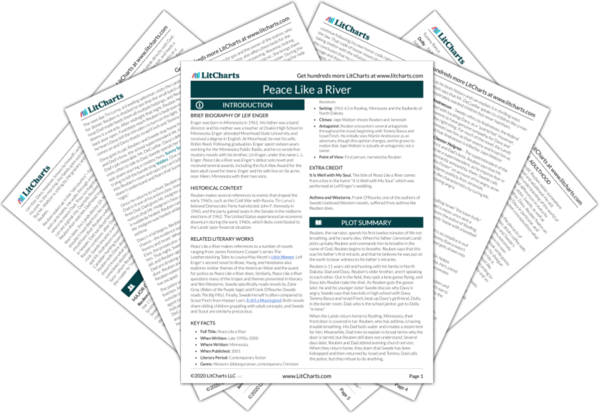Summary
Analysis
Ten days before Davy's trial, a newspaper publishes an article that paints Tommy Basca as a loveable, if misunderstood, victim of a senseless crime. The papers are more than ready to write about Davy as a murderer, and the timing seems predestined. Swede makes snide comments and remains resentful of this turn of events and of Israel and Tommy, but Reuben says that he eventually realized that Tommy, while an idiot, wasn't truly evil. This article resulted in a number of letters for Davy, one of them opening with "Dear butcher."
Reuben continues to use the newspaper coverage and Davy's letters to examine how a story changes depending on one's point of view. Tommy's family, at least, experienced grief and loss when he died. The adult Reuben's commentary here shows the end result of his growing up process: he eventually accepted that Tommy's death was a loss to someone, and that isn't negated by what Tommy did to the Lands.
Themes
Thomas DeCuellar finds this troubling. He tells Dad one night that people are sympathizing with Israel and Tommy, and asks Dad if he's read the papers. Mr. DeCuellar says that the jury is free to do and read what they please until the trial starts. He tells the Lands not to talk to reporters and leaves after a big hug from Swede.
The stories in the paper have real-world consequences, as evidenced by Mr. DeCuellar's fears. He sees that the emotions elicited by the stories in the papers may turn the jury against Davy, despite the fact that the jury is supposed to be rational and only take the facts of the case into account.
Themes
The next day, Mr. Holgren fires Dad. In the school cafeteria, Reuben sits with his class drinking milk out of bottles, the entire class wearing paper pilgrim hats in observation of Thanksgiving. Mr. Holgren enters, his acne-ridden face as grotesque as always, and pulls out his own paper pilgrim hat. Mr. Holgren begins to speak, but Reuben isn't listening. He's transfixed by the text saying “shoot me!” written on Mr. Holgren's hat. Reuben tries not to laugh, but loses the battle when a classmate leans over and whispers "Bang" in his ear.
The lack of explanation surrounding Mr. Holgren's hat and the text on it turns this situation into something absurd—a scene that almost seems fictional in a story that's very realist. However, it's obviously real—Reuben's classmate could read the text too. This all works to make Dad's firing seem even more absurd and unjust.
Themes
Reuben laughs and Mr. Holgren glares at him before starting towards him around the table. Mr. Holgren hits the table with his thigh and sends six bottles of milk toppling to the floor. Dad appears and begins to clean up the milk. Reuben feels ashamed that his dad is a janitor. Mr. Holgren addresses Dad and mentions that people have complained about him stumbling and muttering, even in public. Reuben realizes that word of what happened at church with Reverend Johnny has spread, and knows that Dad won't defend himself.
Despite Reuben's obvious love and admiration for his father, he's not exempt from childish shame at his father's profession. Reuben also knows that the muttering is just Dad praying, which shows how religion can be distorted for one's own unsavory purposes. Religion here becomes a liability.
Themes
Get the entire Peace Like a River LitChart as a printable PDF.

Mr. Holgren then angrily fires Dad. As Reuben starts toward his father, he watches Dad reach up and slap Mr. Holgren in the face. Dad then turns to walk away, but Reuben watches transfixed as he notices that Mr. Holgren's horrible complexion has suddenly turned healthy. This makes Reuben angry enough that his lungs contract, and he has to go to the nurse's office to breathe steam. Reuben refuses to allow Dad to take him home, and can only ruminate on the injustice that Dad healed the evil "Chester the Fester" while Reuben, Jeremiah's own son, remains asthmatic.
This miracle of healing Mr. Holgren's acne mirrors Jesus healing the sick, creating more comparisons between Dad and Jesus. Again, Reuben experiences emotions of injustice and unfairness that are indicative of his youth and immaturity. He doesn't yet understand that Mr. Holgren deserves to be healthy, regardless of how evil he might be to Reuben's family.
Themes












